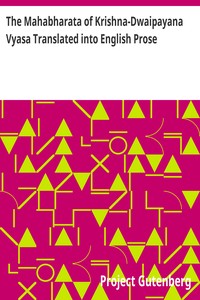The Mahabharata of Krishna-Dwaipayana Vyasa Translated into English Prose: Virata Parva
Bookshelves: Best Books Ever Listings, Culture/Civilization/Society, Literature, Religion/Spirituality/Paranormal, Hinduism

Summary
"The Mahabharata of Krishna-Dwaipayana Vyasa Translated into English Prose" by Kisari Mohan Ganguli is an epic narrative written during the late 19th century. This monumental work recounts the intricate tales of the Kurukshetra War and the fates of the Kaurava and Pandava princes, exploring themes of duty, righteousness, and the moral dilemmas faced by its characters. The particular focus here is on the Pandavas during their thirteenth year of exile, where they must live secretly in the kingdom of Matsya to avoid detection by their enemies. At the start of this portion, we meet the Pandavas, who are devising their plan to live inconspicuously in the city of Virata after twelve years of exile. Yudhishthira suggests they take on different roles to hide their identities, with each brother, including Draupadi, presenting themselves in specific capacities: Yudhishthira as a Brahmana skilled in dice, Bhima as a cook, Arjuna disguised as a female dance instructor, and the twins Nakula and Sahadeva taking care of the horses and kine, respectively. This section sets the stage for an engaging exploration of their new lives, challenges, and the themes of identity and survival in the context of their ongoing feud with the Kauravas. As their time in disguise progresses, each character grapples with internal struggles and the threat of being discovered, reflecting the complexities of their circumstances. (This is an automatically generated summary.)
 LibraryManager
LibraryManager